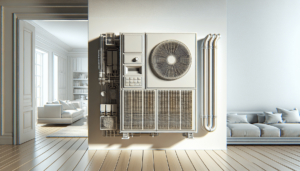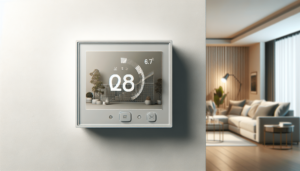

HVAC Services
Get Professional Repairs From The Area's Trusted HVAC Technicians. Ask About Our Services! We Offer Professional Heating & Cooling System Repairs And Guarantee Long-Lasting Results.
Got Question? Call us: (850) 678-2665Financing
Budgeting For A New HVAC: Tips And Considerations

Are you thinking about investing in a new HVAC system but unsure about the costs and considerations involved? Look no further! In this article, we will provide you with useful tips and important factors to consider when budgeting for a new HVAC unit. From understanding the different types of systems available to evaluating the installation and maintenance costs, we’ve got you covered. Whether you’re a homeowner or a business owner, making informed decisions about your HVAC investment is crucial. So, let’s dive right in and explore the world of budgeting for a new HVAC system together!
Determining the Need for a New HVAC
Assessing the current HVAC system
When considering the need for a new HVAC system, it’s essential to start by assessing the current one. Take a look at how well it’s been functioning and if any issues have arisen recently. Has it been struggling to maintain a comfortable temperature? Are you experiencing frequent breakdowns or repairs? By evaluating the overall performance of your current system, you can determine if it’s time for a replacement.
Considering the age of the system
Another factor to consider when determining the need for a new HVAC system is its age. Most HVAC systems have a lifespan of around 15-20 years, so if your system is approaching or has surpassed this timeframe, it may be time to start planning for a replacement. Older systems tend to be less energy-efficient and more prone to breakdowns, so investing in a new system can provide significant benefits.
Evaluating the efficiency and performance
Efficiency and performance are crucial when it comes to an HVAC system. Older systems tend to be less energy-efficient compared to newer models. As technology advances, HVAC systems become more energy-efficient, which can lead to cost savings on your utility bills. Additionally, if your current system is struggling to maintain a consistent temperature or doesn’t distribute air evenly, it may be time to explore the options for a new HVAC system.
Assessing repair costs vs. replacement costs
When faced with frequent repairs and breakdowns, it’s important to consider the costs associated with repairs versus the cost of a replacement. If your system requires constant repairs, these costs can quickly add up and may end up being more expensive in the long run than investing in a new system. It’s essential to weigh the financial impact of ongoing repairs against the upfront cost of a replacement HVAC system to make an informed decision.
Setting a Budget
Researching average costs
Setting a budget for a new HVAC system starts with researching the average costs in your area. It’s important to have a rough estimate of what to expect so you can plan accordingly. Keep in mind that the cost can vary depending on factors such as the size of your home, the complexity of the installation, and the type of HVAC system you choose.
Considering energy efficiency ratings
Energy efficiency ratings, such as SEER (Seasonal Energy Efficiency Ratio), play a significant role in the cost of operating your HVAC system over time. While more energy-efficient systems may have a higher upfront cost, they can lead to substantial savings on your utility bills in the long run. Consider the potential energy savings when setting your budget for a new HVAC system.
Determining the capacity needed
The size and capacity of the HVAC system you need will impact its cost. A system that is too small or too large for your home can lead to inefficient operation and potentially higher energy bills. Consulting with HVAC professionals can help determine the correct capacity needed for your home, allowing you to set a realistic budget based on the appropriate system size.
Factoring in installation costs
In addition to the cost of the HVAC system itself, it’s crucial to factor in the installation costs when setting your budget. Professional installation ensures that the system is set up correctly and functions optimally. The complexity of the installation, such as any required ductwork modifications or replacements, can influence the overall cost. Obtaining multiple quotes from reputable HVAC companies can help you get a better idea of the installation costs involved.
Estimating ongoing maintenance and repair expenses
When budgeting for a new HVAC system, it’s essential to consider the ongoing maintenance and repair expenses. Routine maintenance, such as annual inspections and filter replacements, will be necessary to keep your system running efficiently and prolong its lifespan. Additionally, unforeseen repair costs can arise, so it’s wise to set aside some funds for potential repairs in the future.
Exploring Financing Options
Researching available financing programs
If the upfront cost of a new HVAC system is a concern, there are various financing programs available to help make it more manageable. Researching these programs can provide you with options for spreading out the cost over time, allowing you to have a new system installed without a significant financial burden upfront.
Considering personal savings
Using personal savings is another viable option for financing a new HVAC system. If you have funds set aside for home improvements or emergencies, tapping into these savings can provide a straightforward and interest-free way to pay for your new system. However, it’s crucial to assess if this is the best use of your savings and consider any potential financial implications.
Exploring HVAC dealer financing
Many HVAC dealers offer financing options to help homeowners finance their new systems. These financing programs may come with competitive interest rates and flexible payment terms, making it easier for you to fit the cost of the HVAC system into your monthly budget. Exploring these options can provide you with a convenient way to fund your new HVAC system.
Looking into home equity loans or lines of credit
For homeowners who have accumulated equity in their homes, a home equity loan or line of credit can be a viable financing option. These types of loans generally have lower interest rates compared to other forms of financing and can provide you with the funds needed to invest in a new HVAC system. However, it’s essential to evaluate the potential risks and benefits before opting for this financing option.
Obtaining Multiple Quotes
Researching reputable HVAC companies
When looking to obtain multiple quotes for a new HVAC system, it’s crucial to research and find reputable HVAC companies in your area. Look for companies with a proven track record, positive customer reviews, and the necessary certifications and licenses. Working with a reputable company ensures that you receive quality products and services for your investment.
Contacting multiple providers for quotes
Once you have identified reputable HVAC companies, reach out to them to request quotes for your new system. It’s recommended to contact at least three providers to ensure you have a range of options to compare. Provide each company with the necessary details about your home and desired HVAC system, so they can provide accurate quotes.
Comparing prices, warranties, and services
When you receive the quotes from different HVAC providers, take the time to compare prices, warranties, and services offered. While the cost is important, it shouldn’t be the sole determining factor. Consider the length and coverage of the warranties, as well as any additional services or benefits provided by each company. This thorough comparison will help you make an informed decision.
Evaluating customer reviews and testimonials
In addition to comparing quotes, it’s essential to evaluate customer reviews and testimonials for each HVAC company you are considering. Customer feedback can provide valuable insights into the company’s reputation, customer service, and overall satisfaction. Choose a company that consistently receives positive reviews and has a reputation for excellence in their field.
Considering Energy Efficiency
Understanding SEER ratings
SEER ratings play a significant role in the energy efficiency of an HVAC system. SEER stands for Seasonal Energy Efficiency Ratio and indicates how efficiently the system can cool your home during the summer months. Higher SEER ratings mean greater energy efficiency and potential cost savings on your utility bills. When considering a new HVAC system, it’s important to understand SEER ratings and take them into account.
Exploring ENERGY STAR certified models
ENERGY STAR is a program that identifies energy-efficient products, including HVAC systems. Exploring ENERGY STAR certified models can help you narrow down your options to those that meet strict energy efficiency guidelines. These models can provide significant energy savings and may qualify for rebates or incentives through various programs. When making your decision, consider the potential energy savings and environmental benefits of ENERGY STAR certified models.
Assessing long-term energy savings
While the upfront cost of an energy-efficient HVAC system may be higher, it’s crucial to consider the long-term energy savings. Energy-efficient systems can reduce your monthly utility bills and provide cost savings over the lifespan of the system. When assessing the financial implications of a new HVAC system, factor in the potential long-term energy savings and calculate the return on investment.
Considering smart or programmable thermostats
In addition to choosing an energy-efficient HVAC system, considering the use of smart or programmable thermostats can further enhance energy efficiency. These thermostats allow you to set schedules and adjust temperatures remotely, ensuring that your system runs only when necessary and optimizes energy usage. The integration of advanced technology can provide even more significant energy savings, further justifying the investment in a new HVAC system.
Exploring Rebates and Incentives
Researching local, state, and federal programs
When budgeting for a new HVAC system, it’s essential to research the various rebate and incentive programs available at the local, state, and federal levels. These programs are designed to encourage energy-efficient upgrades and can provide financial assistance for homeowners. Check with your local utility company, government websites, and relevant organizations to identify any available programs that can help offset the cost of your new HVAC system.
Identifying available rebates and tax credits
Rebates and tax credits can significantly reduce the overall cost of a new HVAC system. These incentives can vary depending on your location and the type of system you choose. Identifying the available rebates and tax credits can help you estimate how much you may save and make it easier to set a budget. Be sure to carefully review the eligibility requirements and application processes to ensure you qualify.
Checking for utility company incentives
Many utility companies offer incentives for energy-efficient upgrades, including HVAC system replacements. These incentives can range from cash rebates to discounted installation services. Check with your utility company to see if they offer any programs that can help offset the cost of your new HVAC system. Taking advantage of these incentives can make a significant difference in your budget and overall investment.
Understanding eligibility requirements
When exploring rebates and incentives, it’s essential to understand the eligibility requirements for each program. Some programs may have income limitations, specific equipment requirements, or other criteria that must be met. Carefully review the requirements to ensure you qualify and gather any necessary documentation to support your application. Understanding the eligibility requirements will help you accurately factor in any potential savings into your budget.
Estimating Installation Costs
Consulting with HVAC professionals
To accurately estimate the installation costs of a new HVAC system, it’s recommended to consult with HVAC professionals. They have the expertise and experience to assess your home’s specific requirements and provide detailed estimates. By having professionals evaluate your home and provide quotes, you can ensure that the installation costs are accurately estimated and accounted for in your budget.
Considering ductwork modifications or replacements
If your home’s existing ductwork is outdated or doesn’t meet the requirements of the new HVAC system, additional costs for ductwork modifications or replacements may arise. It’s essential to factor in these potential costs when setting your budget. The complexity and extent of the necessary ductwork modifications or replacements will influence the overall installation costs.
Evaluating electrical and plumbing requirements
Depending on the type of HVAC system you choose, there may be electrical and plumbing requirements that need to be met during installation. It’s crucial to evaluate these requirements and consider any associated costs. If upgrades or modifications are needed to meet the electrical and plumbing requirements of the new system, make sure to include them in your budget.
Factoring in permits and inspections
When installing a new HVAC system, permits and inspections may be required by local building codes. These additional costs should be factored into your budget. Check with your local authorities to determine the specific requirements and associated fees. Ensuring that all necessary permits and inspections are obtained will help you avoid any potential legal issues and ensure a smooth installation process.
Considering Maintenance and Repair Costs
Researching manufacturer’s warranty
One of the key aspects to consider when budgeting for a new HVAC system is the manufacturer’s warranty. Different manufacturers offer varying warranty lengths and coverage. Researching the warranty options available for the HVAC system you are considering will help you estimate future repair costs. Opting for a system with a comprehensive warranty can provide peace of mind and potentially reduce maintenance and repair expenses.
Estimating routine maintenance expenses
Routine maintenance is crucial to keep your HVAC system running efficiently and prolong its lifespan. It’s essential to estimate the expenses associated with routine maintenance when setting your budget. Regular maintenance tasks, such as filter replacements and system inspections, may incur additional costs. Consulting with HVAC professionals can provide guidance on the frequency and estimated costs of routine maintenance for your new system.
Preparing for potential repair costs
While proper maintenance can minimize the likelihood of significant repairs, it’s important to be prepared for potential repair costs. Even with a new HVAC system, unexpected issues can arise. Setting aside funds in your budget for potential repairs can alleviate financial stress if a repair is needed. Consider the age of the system, the manufacturer’s warranty coverage, and any extended warranties or service plans when estimating potential repair costs.
Considering extended warranties or service plans
To further protect against potential repair expenses, considering extended warranties or service plans may be beneficial. Many HVAC manufacturers or third-party providers offer these plans, which can provide coverage for repairs beyond the standard warranty period. Evaluating the cost and coverage of extended warranties or service plans can help you determine if they are worth including in your budget.
Factoring in Long-Term Savings
Assessing potential energy savings
One of the significant long-term savings associated with a new HVAC system is the potential reduction in energy costs. Energy-efficient systems can significantly lower your monthly utility bills, providing ongoing savings throughout the lifespan of the system. Assessing the potential energy savings based on the system’s efficiency rating and your home’s energy usage can help you understand the long-term financial benefits of investing in a new HVAC system.
Considering improved comfort and indoor air quality
In addition to energy savings, a new HVAC system can provide improved comfort and indoor air quality. By investing in a more efficient and modern system, you can ensure consistent temperatures throughout your home and better control humidity levels. Additionally, newer systems often include advanced air filtration systems that can improve indoor air quality. Consider the overall comfort and health benefits of a new HVAC system when factoring in long-term savings.
Evaluating resale value impact
Upgrading to a new HVAC system can positively impact the resale value of your home. Potential buyers often value energy-efficient and modern HVAC systems, seeing them as desirable features. The installation of a new system can enhance your home’s appeal and potentially increase its resale value. When considering the long-term savings of a new HVAC system, factor in the potential return on investment when selling your home in the future.
Factoring in lifespan and replacement costs
HVAC systems have a limited lifespan, typically ranging from 15 to 20 years. When budgeting for a new system, it’s essential to factor in the eventual replacement costs. By setting aside funds each year for future replacement, you can better prepare for this significant expense when the time comes. Estimating the replacement cost based on the size, capacity, and type of system you choose will help you plan for this future expenditure.
Making an Informed Decision
Considering all budgetary factors
When making a decision about a new HVAC system, it’s crucial to consider all the budgetary factors outlined above. Take into account the costs of the system, installation, ongoing maintenance, and potential repairs. Additionally, factor in any energy savings, incentives, and long-term financial benefits. By considering all these factors together, you can make an informed decision that aligns with your budget and provides the best value for your investment.
Weighing the benefits of replacement
As you evaluate the need for a new HVAC system and assess your budget, it’s important to weigh the benefits of replacement. Consider the potential energy savings, improved comfort, and overall performance of a new system compared to your current one. Additionally, factor in any potential repair costs and ongoing maintenance expenses associated with your current system. Balancing the benefits of replacement against the costs will help guide your decision-making process.
Consulting with HVAC experts
When it comes to making a decision about a new HVAC system, consulting with HVAC experts can provide valuable insights. Professionals in the industry have the experience and knowledge to guide you through the process. They can assess your specific needs, answer your questions, and provide recommendations based on your budget and requirements. Seeking the advice of HVAC experts ensures that you make an informed decision that meets your heating and cooling needs.
Planning for the installation process
Once you have made the decision to invest in a new HVAC system, it’s important to plan for the installation process. Coordinate with the HVAC company you have chosen and ensure that all necessary permits and inspections have been obtained. Make any necessary preparations in your home, such as clearing the installation area and ensuring access for the HVAC technicians. Proper planning will help ensure a smooth installation process and minimize any inconvenience or disruptions.
In conclusion, budgeting for a new HVAC system requires careful consideration and evaluation of various factors. Assessing the need for a new system, setting a realistic budget, exploring financing options, obtaining multiple quotes, considering energy efficiency, exploring rebates and incentives, estimating installation costs, factoring in maintenance and repair costs, and evaluating long-term savings are all crucial steps in making an informed decision. By carefully weighing these factors and seeking guidance from HVAC professionals, you can successfully budget for a new HVAC system and enjoy the benefits of improved comfort, energy efficiency, and long-term savings.







